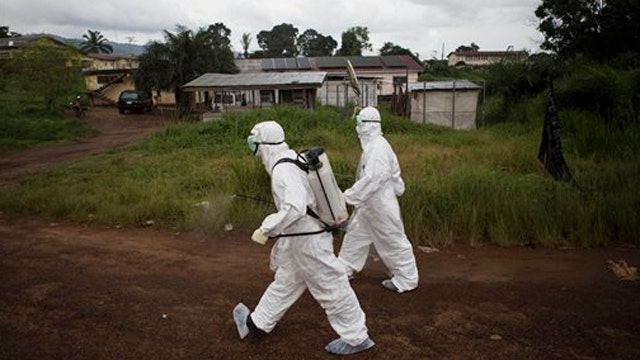U.S. military personnel have begun constructing tent hospitals and other facilities to help fight the Ebola epidemic in West Africa, though experts warn that they may be too late to prevent the outbreak from killing thousands more.
The Wall Street Journal reports that troops from the Navy's 133rd Mobile Construction Battalion began building the first of a dozen planned hospitals in a field outside the main airport in Liberia, one of three countries along with Sierra Leone and Guinea that has been hit the hardest by the epidemic.
As of September 23, the Journal says 6,574 cases had been reported in five West African countries -- Senegal and Nigeria are the other two -- with 3,091 deaths reported. Those official numbers represent a twofold increase in both categories from August, and global health officials have repeatedly stated their belief that the number of cases has been underreported by a factor of three or four. Last week, the Centers for Disease Control and Prevention predicted that the number of cases would skyrocket to 1.4 million without international aid.
President Obama announced that 3,000 U.S. troops would be sent to West Africa on September 16. In addition to hospital construction, the military's duties include unloading medical supplies and training nurses. However, the Journal reported that U.S. officials are still hashing out final details of the mission.
"There is no argument the disease is out in front of the response," Ken Isaacs, vice president of programs and government relations for the relief organization Samaritan's Purse, told the paper. "Where we are today is where we should have been 60 to 90 days ago."
According to the Journal, both World Health Organization clinics that have opened in the Liberian capital of Monrovia have filled almost immediately. Meanwhile, the Liberian government's struggles in the face of the epidemic continue. On Friday, the country's chief medical officer placed herself under a 21-day quarantine, fearing that she may have been exposed to the virus.
Also, days after President Obama called on governments and organizations to step up aid at the United Nations General Assembly, Australia's government ruled out sending doctors to the region because of logistical problems in repatriating any Australian who became infected.
Foreign Minister Julie Bishop said the Australian Health and Defense Departments had both advised that Australia could not safely evacuate Australian health workers back home, telling reporters, "The Australian government is not about to risk the health of Australian workers in the absence of credible evacuation plans that could bring our people back to Australia."
The Associated Press contributed to this report.

